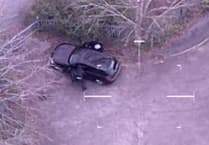TOUGHER sanctions for fly-tippers could be on the way after a campaign by Avon and Somerset Police and Crime Commissioner (PCC) Mark Shelford and his counterparts in Devon and Cornwall, Dorset, Gloucestershire, and Wiltshire.
The PCCs have lobbied the Department for Environment, Food and Rural Affairs (DEFRA) and were told their suggestions were being considered.
In a letter sent last month the PCCs said a new way was needed to tackle the ‘growing menace’ of fly-tipping.
They believed urgent action was needed, particularly with the cost-of-living crisis impacting the lives of millions of people.
The cost of fly-tipping on private land was estimated to be up to £150n million a year and the cost for local authorities in England of clearing fly-tipped material was put at nearly £50 million.
The group of PCCs said ‘greater co-ordination’ and ‘tougher penalties’ were needed to meet the Government’s target of eradicating waste crime by 2043.
They outlined five approaches they believed would reduce fly-tipping, including raising the maximum fixed penalty fine for small-scale offences to £1,000 and imposing a minimum £50,000 for repeat, large-scale offenders.
The PCCs welcomed measures such as digital waste tracking, fixed penalty notices, and the increased use of CCTV in fly-tipping hotspots, but said more needed to be done to deter fly-tipping, which had become the ‘anti-social behaviour of the countryside’.
Local MP Rebecca Pow, the Minister responsible for the policy area, told the PCCs DEFRA would be considering their suggestions.
Ms Pow said the Government would also explore the effectiveness of the different enforcement options available to local authorities, including fixed penalties and the barriers they faced in using them.
Mr Shelford said: “It is time to make criminals pay for fly-tipping, not local people.
“I am delighted that Rebecca Pow is supportive in the five PCCs coming together to fight the scourge of fly-tipping.
“This is a step in the right direction.
“This crime blights our rural landscape and causes problems to farmers and the rural economy.
“I am committed to working with partner agencies to find new ways to tackle this problem.”





Comments
This article has no comments yet. Be the first to leave a comment.